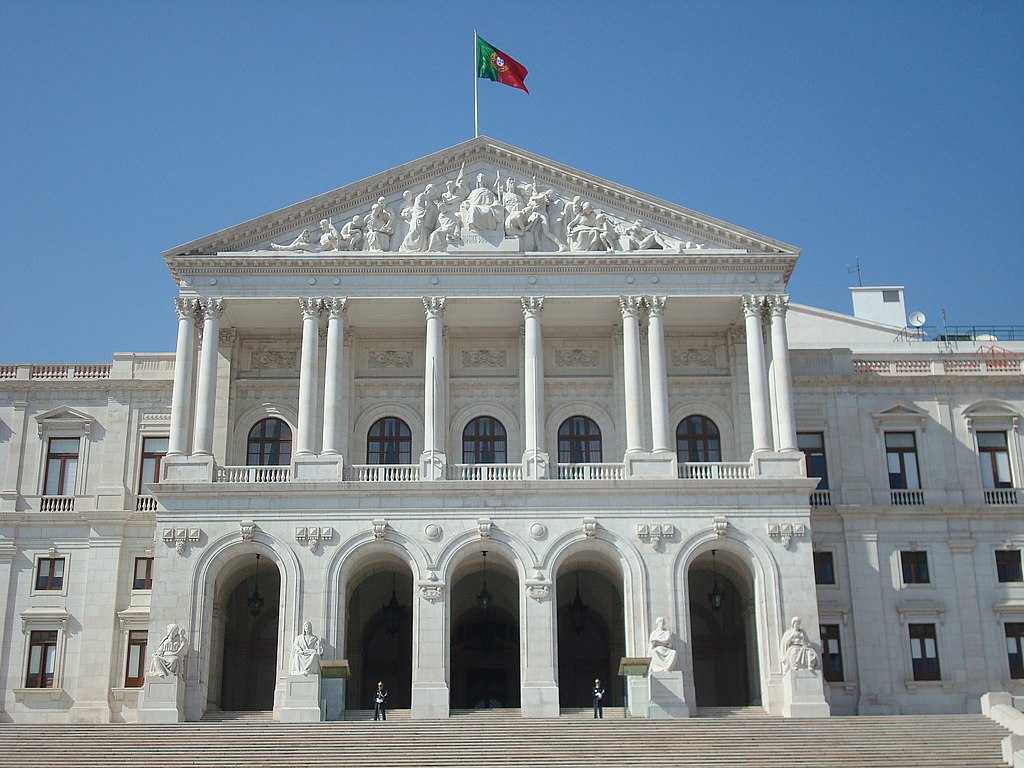Reuters | December 3, 2024 |

Portuguese Parliament building. Credit: Wikimedia Commons
Portugal’s government plans to launch a long-delayed tender of lithium prospecting licences in 2025 as it seeks to make the country a top European supplier of critical metals for the green transition, it said on Tuesday.

The center-right government, which took over in April, said that the international tender for lithium prospecting will target six areas in the north and center of the country.
The previous Socialist administration initially planned an auction in 2018 but concerns about the environmental and social impact of lithium mining have led to multiple delays to the auction.
Environment Minister Maria da Graca Carvalho said that the tender is part of Portugal’s plans to meet Europe’s goals to ensure greater security and reduce dependence on imports of critical materials from countries such as China.
“Our intention is to move forward with the tender in 2025,” she told journalists, adding that the government wants to speed up the licensing processes for projects, “but will be demanding in assessing the environmental impacts.”
With some 60,000 tonnes of known reserves, Portugal is Europe’s biggest lithium producer but its miners sell almost exclusively to the ceramics industry and are only now preparing to produce the higher-grade lithium for use in electric vehicles.
Portugal’s environmental agency APA has already given its initial approval to lithium extraction at the Barroso mine, owned by London-based company Savannah Resources, and at the Montalegre mine of the local firm Lusorecursos, both in the north of the country.
The start of exploration in both mines is scheduled for 2027 as they still need licensing authorizations for the concrete projects.
Lithium miners around the globe are struggling with low prices for this ore, which have fallen by more than 45% so far this year, largely due to overproduction from China and a drop in demand for EVs.
China supplies two-thirds of processed lithium globally and, according to International Energy Agency data, it has also taken a huge lead in powering EVs, controlling 85% of global battery cell production.
Carvalho also said that the government intends to launch tenders for new copper and gold prospecting licences next year.
Portugal already has the sixth-largest copper mine in Europe, operated by Toronto-based Lundin Mining. It had stopped actively exploring for gold more than 30 years ago.
(By Sergio Goncalves; Editing by Aislinn Laing and Mark Porter)
Portugal’s government plans to launch a long-delayed tender of lithium prospecting licences in 2025 as it seeks to make the country a top European supplier of critical metals for the green transition, it said on Tuesday.

The center-right government, which took over in April, said that the international tender for lithium prospecting will target six areas in the north and center of the country.
The previous Socialist administration initially planned an auction in 2018 but concerns about the environmental and social impact of lithium mining have led to multiple delays to the auction.
Environment Minister Maria da Graca Carvalho said that the tender is part of Portugal’s plans to meet Europe’s goals to ensure greater security and reduce dependence on imports of critical materials from countries such as China.
“Our intention is to move forward with the tender in 2025,” she told journalists, adding that the government wants to speed up the licensing processes for projects, “but will be demanding in assessing the environmental impacts.”
With some 60,000 tonnes of known reserves, Portugal is Europe’s biggest lithium producer but its miners sell almost exclusively to the ceramics industry and are only now preparing to produce the higher-grade lithium for use in electric vehicles.
Portugal’s environmental agency APA has already given its initial approval to lithium extraction at the Barroso mine, owned by London-based company Savannah Resources, and at the Montalegre mine of the local firm Lusorecursos, both in the north of the country.
The start of exploration in both mines is scheduled for 2027 as they still need licensing authorizations for the concrete projects.
Lithium miners around the globe are struggling with low prices for this ore, which have fallen by more than 45% so far this year, largely due to overproduction from China and a drop in demand for EVs.
China supplies two-thirds of processed lithium globally and, according to International Energy Agency data, it has also taken a huge lead in powering EVs, controlling 85% of global battery cell production.
Carvalho also said that the government intends to launch tenders for new copper and gold prospecting licences next year.
Portugal already has the sixth-largest copper mine in Europe, operated by Toronto-based Lundin Mining. It had stopped actively exploring for gold more than 30 years ago.
(By Sergio Goncalves; Editing by Aislinn Laing and Mark Porter)
No comments:
Post a Comment